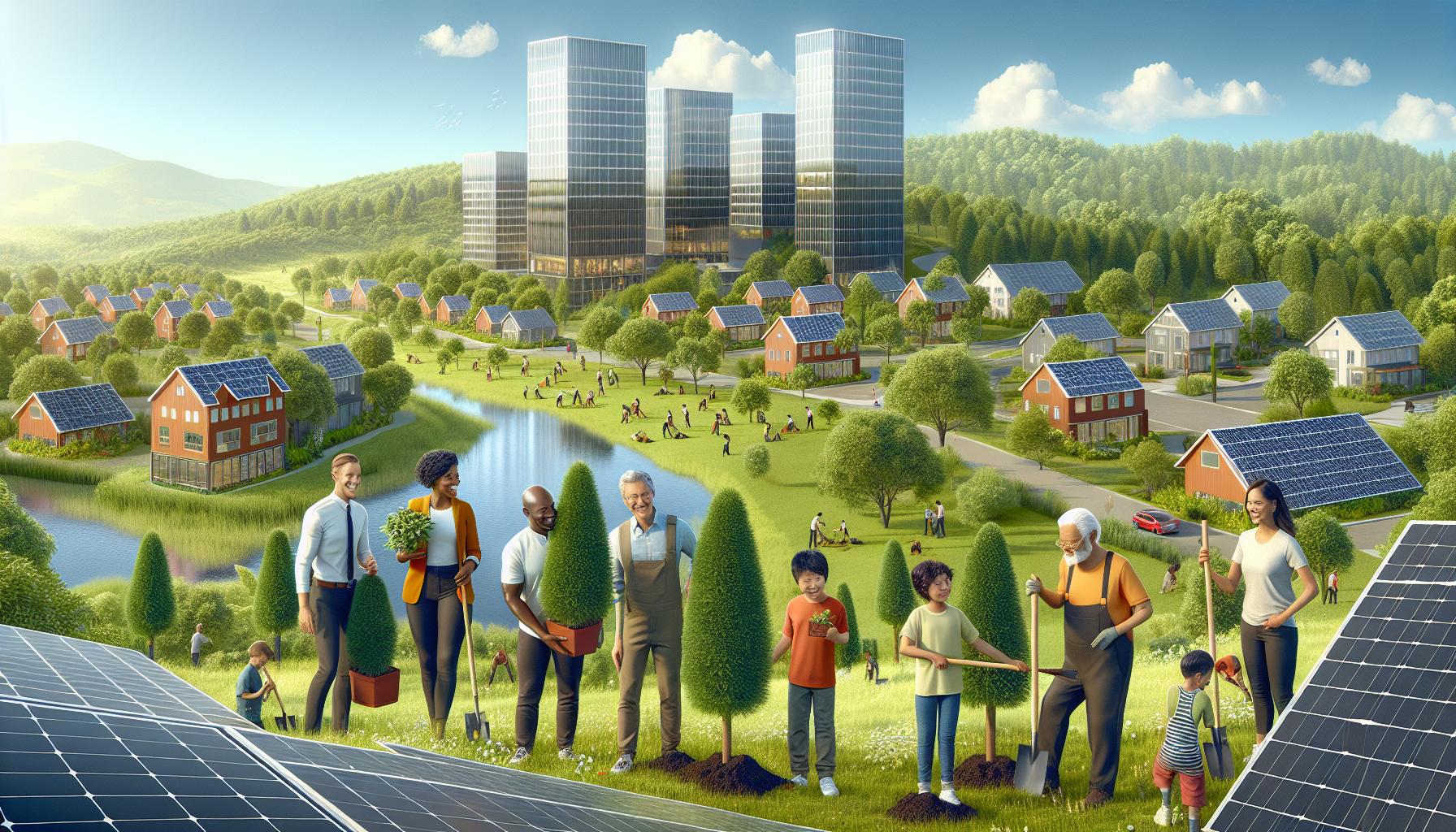Nestled in the heart of Washington, Issaquah is more than just a city with a quirky name. It’s a beacon of sustainability that’s leading the way for other cities around the globe. With its unique blend of innovation and environmental stewardship, Issaquah is redefining what it means to be a sustainable city.
From its green building initiatives to its commitment to clean energy, Issaquah isn’t just talking the talk—it’s walking the walk. But what makes this city truly stand out? And how can other cities follow in its eco-friendly footsteps? Let’s dive in and explore the sustainable secrets of Issaquah.
Issaquah’s Commitment to Sustainability
Sustainability sits at the heart of Issaquah’s initiatives. It’s a responsibility synonymous with the city’s name, overarching all facets from urban planning to energy production. The city’s consistent focus on environmental stewardship establishes its distinctive identity as a model of sustainability.
Eco-Friendly Urban Planning
Issaquah’s urban planning, marked by eco-friendly strategies, reinforces its commitment to sustainability. Intense urban expansion often ignites environmental issues, a trend Issaquah circumvents through mindful planning. High-density developments, which pave the way for walkable neighborhoods, usurp incessantly extending city borders. Public transportation improvements, abundant in Issaquah, make commuting more efficient, reducing carbon emissions drastically. Parks, green belts, and nature preserves—the tokens of Issaquah—integrate green spaces into the city’s blueprint, delivering a city-scape where nature coexists harmoniously with human habitats. For instance, Issaquah’s Confluence Park, straddling across 12 acres of land, epitomizes the city’s commitment to preserving its natural landscapes amidst urban development.
Renewable Energy Initiatives
Issaquah’s renewable energy initiatives further affirm its commitment to environmental sustainability. The city doesn’t shy away from bold, ambitious targets; by 2025, Issaquah has plans to ensure that half of the city’s energy comes from renewable sources. Solar energy, harnessed extensively in Issaquah, illuminates the pivotal role of renewable resources in the city’s energy roadmap. The Issaquah Highlands, a one-of-a-kind solar project, boasts over 3,000 solar panels, offsetting including 740 metric tons of carbon emissions annually. The city’s unwavering dedication to renewable energy ventures dovetails impeccably into its broad framework of sustainability.
Green Spaces and Parks in Issaquah
When it comes to sustainability, the city of Issaquah extends its commitment far beyond clean energy and green buildings. The city’s strategic approach to integrating green spaces and parks into the urban environment presents another key aspect of its commitment to sustainability. In this section, we’ll delve into the role these eco-friendly initiatives play in fostering a sustainable community.
Benefits of Urban Greenery
Urban greenery brings immense benefits. It enhances residents’ quality of life, promotes biodiversity, and aids in mitigating climate change. When I walk through Issaquah’s urban green spaces, I can feel these benefits firsthand. Each breath I take is a testament to the air purification provided by trees and plants that capture particulates and absorb pollutants, ensuring clean, breathable air for the community.
Additionally, vegetation can help cool the city. While the urban heat island effect can escalate temperatures in concrete-heavy environments, the presence of trees and vegetation brings down the heat. Especially during the summer months, green spaces in Issaquah provide natural shade and reduce the need for air conditioning.
Lastly, but certainly not least, green spaces serve as crucial habitats for local wildlife. They blend urban and natural environments, encouraging biodiversity by offering a sanctuary for various species of birds, insects, and small mammals.
Major Parks and Their Features
Issaquah boasts several prominent parks, each offering unique features that cater to a diverse array of interests. For example, there’s Confluence Park. Located at the confluence of the Issaquah Creek and the East Fork Issaquah Creek, the park spans 15.5 acres. It offers a mix of recreational facilities and natural areas, including sports fields, picnic areas, an extensive trail system, and wetlands brimming with native flora and fauna.
On the other hand, there’s also the Squak Mountain State Park, a forested haven in the city. Covering an expansive area of over 2,000 acres, the park provides impressive network of trails catered to both hikers and horse riders. When I look up, I’m greeted by the towering trees that form a canopy overhead, demonstrating Issaquah’s commitment to preserving natural spaces.
Each park in Issaquah serves a dual purpose. On one hand, they are places for residents to play, relax, and connect with nature. On the other hand, they are critical components of the city’s urban ecosystem, actively contributing to the overall sustainability and wellbeing of the community. In essence, they encapsulate Issaquah’s harmonious blend of urban development and natural preservation – a testament to its status as a truly sustainable city.
Sustainable Transportation Options
Moving further on Issaquah’s journey towards ecological harmony, another aspect worth highlighting is the city’s commitment to sustainable transportation. Here, I provide an in-depth look at two particular areas where Issaquah is excelling: Public transit expansion and bicycle-friendly infrastructure.
Expansion of Public Transit
One key measure of Issaquah’s commitment to sustainability is the substantial expansion of their public transit system. Public transit provides an efficient and clean alternative to privately owned vehicles, cutting down on congestion and reducing the city’s overall carbon footprint. King County Metro and Sound Transit, the city’s primary transit providers, operate a vast grid of bus routes, connecting Issaquah with other cities in the Greater Seattle Area. These providers constantly add new services, such as the recently introduced Route 628, connecting bustling downtown Issaquah with nearby rural areas. Also, worth mentioning is the Sound Transit’s East Link Light Rail project. Scheduled to be operational by 2023, it’s set to link Issaquah directly to Bellevue and Seattle, decreasing commuting times and fuel consumption.
Bicycle-Friendly Infrastructure
Equally, Issaquah has invested heavily in establishing a bicycle-friendly infrastructure. Bicycling not only contributes significantly towards reduced carbon emissions but also promotes a healthier lifestyle among the citizenry. To this end, Issaquah has installed a network of dedicated cycle lanes, bike racks, and trails across the city. A standout feature is the East Lake Sammamish Trail, a treasured 11-mile long trail offering a scenic and safe route for bikers. It’s a clear attempt to influence a shift in transportation mode by making biking a viable and enjoyable option. Also, yearly events like Bike-to-Work Day and various educational programs encouraging cycling further illustrate the city’s efforts to incorporate bicycles into its sustainability plans.
By investing in such sustainable transportation options, Issaquah affirms its commitment to creating an eco-friendly, vibrant urban environment, seamlessly aligning with its broader sustainability goals.
Community Involvement in Sustainability Efforts
Beyond the city’s measures and initiatives, it’s the community’s involvement that truly drives Issaquah’s sustainability efforts. Residents actively participate in numerous programs, events, and volunteer opportunities, playing a significant role in promoting the shared goal of a greener city.
Educational Programs and Workshops
Education proves pivotal for community involvement. In Issaquah, a variety of programs and workshops aim to raise awareness about sustainability practices and instill them in everyday life. These efforts cover a wide spectrum of topics—from energy consumption and waste management to water conservation and local ecology. For instance, King County’s Master Recycler Composter Program offers free training to residents, empowering them with knowledge about composting and recycling. Another example would be the Invasive Weed Workshops by the King County Noxious Weed Control Program, which educate community members about managing harmful invasive plants.
Volunteer Opportunities and Events
Volunteerism plays a crucial role in Issaquah’s push for sustainability. A calendar overflowing with events provides numerous opportunities for citizens to get their hands dirty and contribute to a more sustainable Issaquah. Events range from park clean-ups and tree planting days, to wildlife habitat work parties. Consider the annual “Friends of Lake Sammamish State Park Cleanup Day,” where volunteers come together to restore the surrounding environment. Similarly, there’s the “Green Issaquah Partnership’s Forest Restoration Event,” which sees community members help restore and maintain Issaquah’s public forests.
In sum, it is through community involvement—and a deep-seated sense of shared responsibility—that Issaquah continues to push the boundaries of what it means to be a sustainable city. Individual efforts compound, serving to solidify the city’s standing as a beacon of sustainability and an example for others to follow.
Conclusion
It’s clear that Issaquah isn’t just talking the sustainability talk, but truly walking the walk. With green buildings, renewable energy, and a community that’s actively participating in making the city greener, it’s a shining example for other cities. The integration of parks and green spaces, along with sustainable transportation, shows a city that’s designed with the environment in mind. But what really stands out is the community’s involvement. From learning about sustainability to volunteering in park clean-ups and tree planting, the people of Issaquah are the real driving force behind its green reputation. So here’s to Issaquah, a city that’s not just living for today, but planning for a sustainable tomorrow.





0 Comments